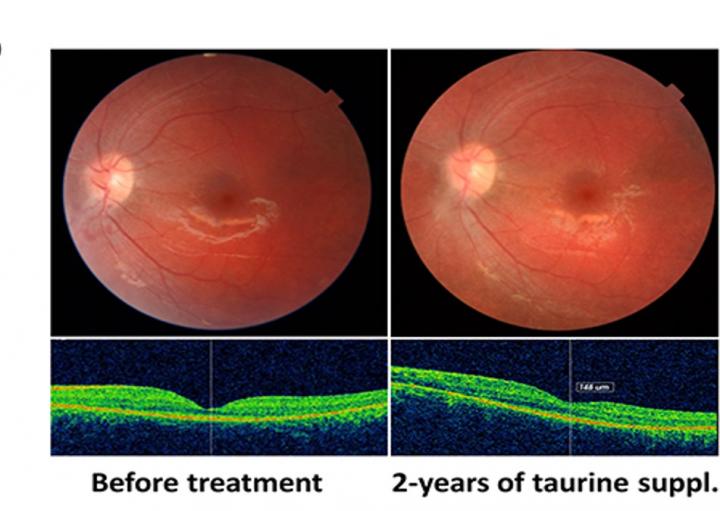UNIGE researchers have discovered a new gene that causes blindness and cardiomyopathy; they have also managed to halt the progression of eye disease and treat cardiac disease by administering a food supplement

Credit: © UNIGE
Our genome consists of 20,000 genes, all of which may be capable of triggering disease. It is estimated that there are 7,000 unknown genes that cause recessive genetic diseases resulting from mutations in two copies of a gene that have been inherited from each parent. Researchers at the University of Geneva (UNIGE), Switzerland, have recently identified 45 new genes that cause blindness or cognitive problems. The scientists focused in particular on the SLC6A6 gene, which encodes a transporter protein that carries an amino acid essential for the functioning of the retina and cardiac muscle: taurine. When there are pathogenic mutations of the SLC6A6 gene, an individual will suffer from a lack of taurine and will gradually lose his sight until he becomes blind within a few years and develops a weak heart. The geneticists at the University of Geneva hypothesised that a taurine supplement might make it possible to compensate for this deficiency. The supplement was given to a young girl suffering from the disease to help stop the progression of her visual degeneration and to treat her cardiomyopathy. You can read all about this innovation in the treatment of recessive genetic diseases in the journal Human Molecular Genetics.
Recessive genetic diseases such as cystic fibrosis are the result of a mutation in the two copies of the same gene inherited from each parent. Researchers from UNIGE – working in collaboration with scientists from Pakistan – studied the genomes of 500 Pakistani families who had ill and healthy children in order to identify as many genes as possible that cause these conditions. “We looked at Pakistani families because consanguineous marriage is still a common practice, with 50% of marriages taking place between first cousins”, explains Stylianos Antonarakis, emeritus professor in UNIGE’s Faculty of Medicine. “In fact, consanguinity increases the risk of developing a recessive genetic disease since about 12% of the genome is identical in cousins.”
New gene identified
One family was a source of particular interest to the researchers: the two parents – healthy first cousins – had four children, two of whom were sick: a 15-year-old boy, who lost all his sight in a few years, and a 4-year-old girl, who was gradually losing her sight but was still able to make out shapes and colours. “With the help of the Khyber Medical University in Pakistan, we collected blood samples of each family member. Their genome sequencing showed that their illness was linked to a mutation of the SLC6A6 gene”, notes Muhammad Ansar, a researcher in the Genetics Department in UNIGE’s Faculty of Medicine. This gene produces a protein of the cell membrane that transports taurine, an amino acid that is especially important for the functioning of the retina and cardiac muscle. “It’s a dietary supplement found in large quantities in certain energy drinks”, says Ansar. Patients suffering from the disease have extremely low levels of taurine in their blood. Professor Keith Henry of the University of North Dakota showed that the genetic abnormality in the family from Pakistan reduced the carrying capacity of taurine to 15% of its normal level.
A reversible recessive disease?
The scientists speculated that it might be possible to block the progression of the disease by administering taurine to the children. They brought the family to Geneva to conduct detailed investigations into this rare genetic disease. In addition to the progressive visual impairment, which was now unfortunately total in the case of the boy, the doctors diagnosed damage to the cardiac muscle in both children. The little girl fortunately still retained some residual vision.
Since taurine is a food supplement rather than a medicine, the Swiss Ethics Commission agreed that it could be administered orally. “We gave 100 mg per kg of taurine daily to the children to be continued over the long-term, and organised regular ophthalmologic and cardiac monitoring sessions in Pakistan”, emphasises Emmanuelle Ranza, a doctor and geneticist at University Hospitals Geneva (HUG) and UNIGE who was responsible for the clinical part of the study. The results quickly came about: in three days, the taurine levels in their blood jumped from 6 to 85 μ mol/l, reaching normal thresholds. And, after two years, the cardiomyopathy had completely disappeared in both children! In addition, the degeneration in the girl’s sight was brought to a halt, and there was even an improvement, meaning she could move around by herself. Unfortunately, this development was not possible for the boy, who had already lost his entire retina.
A single patient can change medicine
“These results are exceptional, because it’s the first time a food supplement given orally has been used to treat the retina and the heart successfully”, points out Antonarakis. “This little girl has paved the way for a potential cure for new-borns suffering from the same recessive disease. One patient can change the history of medicine!” In fact, researchers estimate that there are possibly 6,000 babies worldwide who might suffer from the same SLC6A6-related disease, and around 300 in Europe and North America. “Our goal now is to detect new-borns affected by the condition at an early stage so they can be treated from birth with a taurine supplement and potentially prevent the onset of symptoms”, adds Antonarakis. The geneticists also aim to continue to identify new genes that cause recessive diseases, especially since they now have proof that some of them can be treated effectively.
###
Media Contact
Stylianos Antonarakis
[email protected]
41-223-795-707
Related Journal Article
http://dx.




